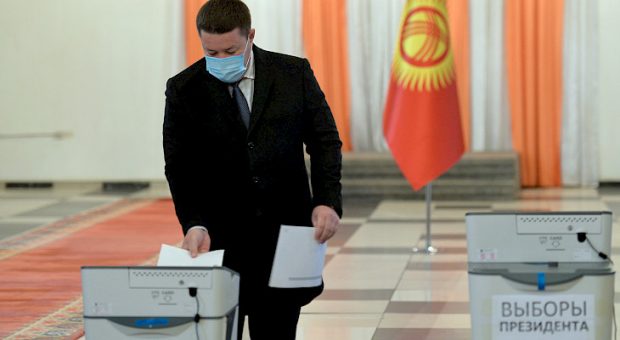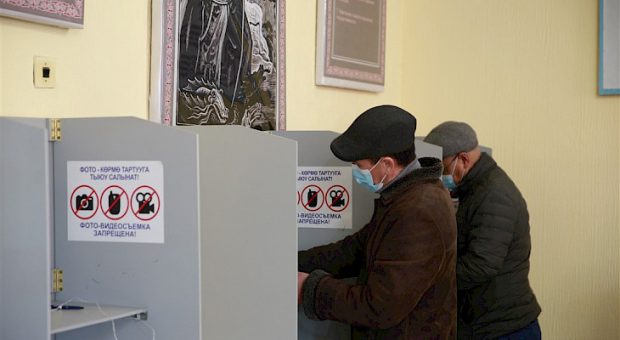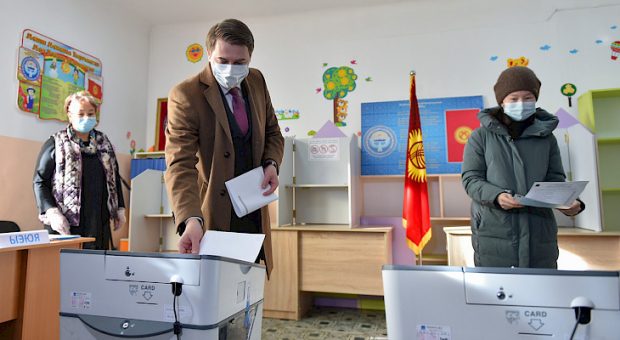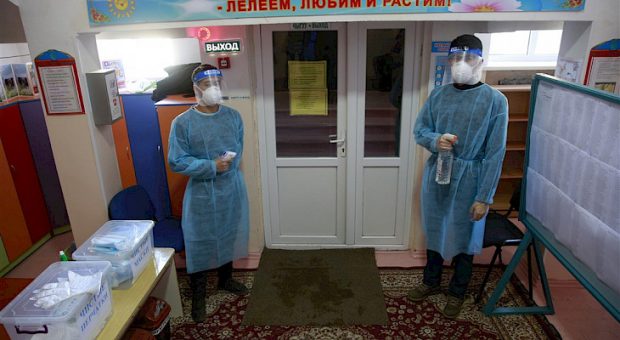Kyrgyz voters cast ballots in presidential elections and referendum

Acting President Mamytov casts his ballots in presidential elections, referendum (Kabar)
By Nurzhan Kasmalieva
Reporter, Kyrgyzstan
BISHKEK: Kyrgyz voters started to cast ballots on January 10 to elect a new president and to determine the form of government.
The voting started in polling station located in Russia’s Yuzhno-Sakhalinsk at 3.00 a.m. (Bishkek time) and the voting began at 8.00 a.m. of Yuzhno-Sakhalinsk time.
A total of 2,474 polling stations have been opened at 8 a.m. throughout Kyrgyzstan.
In addition, 48 overseas stations were opened in 28 countries for Kyrgyz citizens living abroad. Polling stations have been set up in China, in Korea, Japan, Malaysia and other countries as well.
In all, 49,000 citizens of the Kyrgyz Republic are registered for elections abroad.
According to data of the Central Election Commission (CEC), some 3.5 million voters are registered in the country.
More than 300 media representatives, including 92 from 11 countries, are covering the voting procedure.

Voters casting their ballots (Kabar)
Chairperson of the Central Election Commission of Kyrgyzstan Nurzhan Shaildabekova told reporters in Bishkek that necessary conditions for voting have been created in all polling stations.
Minister of Health Alymkadyr Beishenaliev said that due to the COVID-19 pandemic, the work in all polling stations is organized according to the algorithm developed by the country’s Ministry of Health, together with the Central Election Commission.
The aim is to ensure sanitary and epidemiological safety and protect the health of citizens from COVID-19 during the preparation and conduct of elections and referendum in the Kyrgyz Republic.
He said that more than 5,000 medical workers have been involved in providing medical and sanitary assistance to voters.
The voting procedure has been monitored by 333 international observers from 44 countries. International observers have highly praised the voting system in Kyrgyzstan.
Alexei Dosson, an observer from Russia representing the National Youth Council, said that Kyrgyzstan has one of the best voting systems.
This is a reflection of advanced technological solutions of the republic in the matter of transparency of the electoral process, he said.
“It is important to note that Kyrgyzstan has strict legislation giving all candidates equal conditions for campaigning,” he added.
Another observer, member of the Federation Council Committee on Economic Policy of Russia Igor Morozov noted that what the Government of Kyrgyzstan has done for the electoral process and electoral law is worthy of all respect, adding that this model can be one of the basic for all CIS countries.

Voters casting their ballots (Kabar)
In total 17 candidates, including one woman, compete for the presidency in Kyrgyzstan.
Under the Constitution of Kyrgyzstan, any Kyrgyz citizen aged between 35 and 70 years old, fluent in the Kyrgyz language and has resided in Kyrgyzstan for no less than 15 years can be elected as president for a six-year term. The same person cannot be elected president twice.
The early presidential elections was scheduled for January 10 due to the resignation of Kyrgyz President Sooronbai Jeenbekov on October 15 after violent protests in Bishkek following the October 4 parliamentary elections, the results of which were later annulled by the CEC.

Medical care and precautionary measures are provided at polling stations (Kabar)
The referendum will determine the form of government in Kyrgyzstan. Voters are offered to vote for either the presidential or the parliamentary system of governance. They will also have a choice to vote for neither.
Following the 2010 revolution, Kyrgyzstan adopted a new constitution that strengthened parliament and weakened the power of the president and government. This decision was made because ousted presidents Askar Akayev and Kurmanbek Bakiyev constantly exceeded their powers, which led to two revolutions.
The form of government was not specified in the Constitution adopted on June 27, 2010. Official sources state a parliamentary form of government. De facto, the form of government is mixed.
























































